Music is such an integral part of my life, I make a point to listen every day. When I wake up in the morning, on my commute, while I’m working, at the end of the day when I’m loading the dishwasher. Music is almost constant.
Yet music isn’t mere background noise while I go about my life. My aim is to deeply feel and understand the music, which for me requires more than just casual listening. That means reading about the work and its composers, often following along with the score, and always listening again and again.
I’ve learned that I rarely understand something very complicated on the first pass. Whether it’s a complex report for work or an intricate piece of music, I usually need three or even four passes before I’ve internalized it on a truly intuitive level. For this reason, and because I feel music is so important it deserves my considerable time and attention, I’ve developed a system of repeated listening on a weekly basis.
Here’s how it works: taking Beethoven for example, I set aside nine weeks to listen to Beethoven’s nine symphonies in chronological order, one symphony per week, listening to seven different conductors and/or orchestras each day of the week. Haitink and the RCO, Chailly and the GHO, Karajan and the BPO, Szell and Cleveland, the list goes on. In total, I listen to 9×7=63 different recordings of Beethoven’s music, deeply immersing myself in the music and its diverse interpretations.
In practice, this method of repeated listening will often get me so enamored with the music that I’ll listen to more than one recording per day — sometimes three or four. I’ll read books and websites about the composer. I’ll branch out into other works. Before long, I’m setting aside five weeks to listen to Beethoven’s piano concertos and sixteen weeks to listen to his string quartets. Admittedly, it’s a lot!
I’ve been listening like this since January 2015, including the music of Bach, Barber, Bernstein, Borodin, Brahms, Bruckner, Copland, Debussy, Elgar, Fauré, Mahler, Mendelssohn, Mozart, Saint-Saëns, Schoenberg, Schumann, Scriabin, Sibelius, Richard Strauss, Tchaikovsky, Vaughan Williams, and Wagner. I tweaked the formula a bit for Haydn, listening to 106 symphonies in 106 days and 68 string quartets in 68 days, and for an amazingly ear-opening month of listening to a new female composer every day for 31 days.
Listening in this way is a commitment, to say the least, yet tremendously rewarding. It may not work for everyone, probably very few, but it’s how I’ve been able to learn much of the music that I love. I have no doubt I’ll be listening like this for years to come — ardently, endlessly, obsessively.
And now, without further ado, back to the music.

